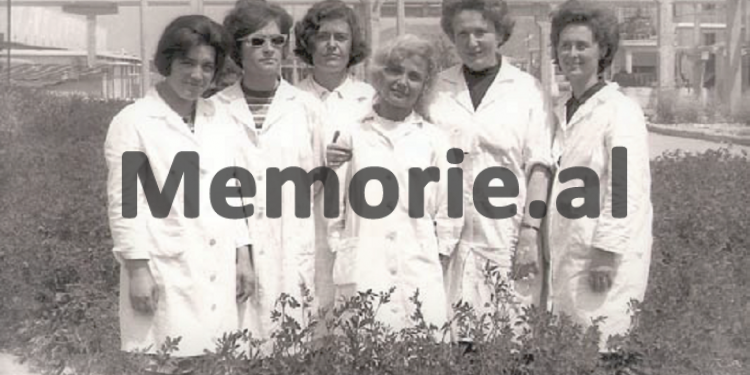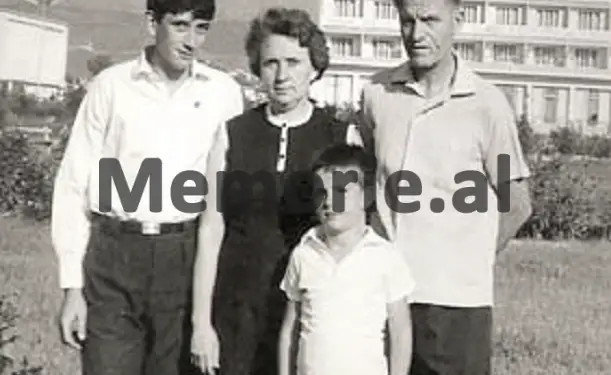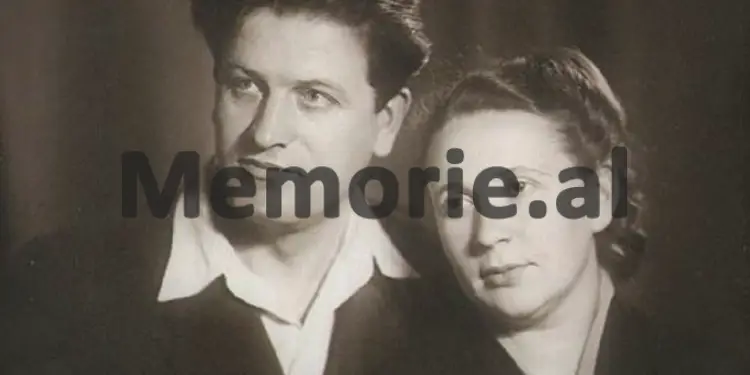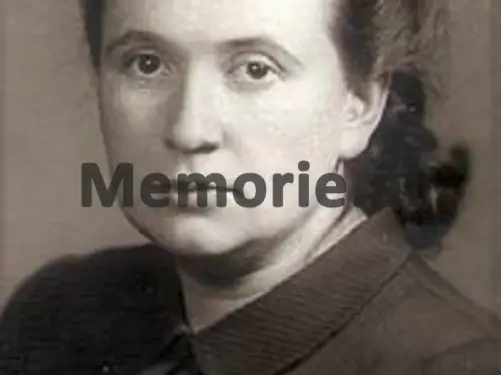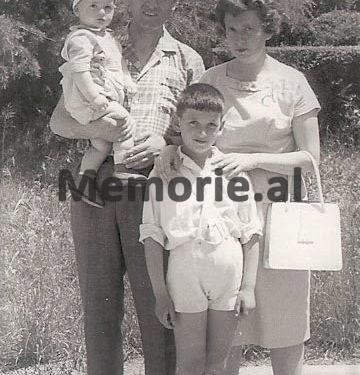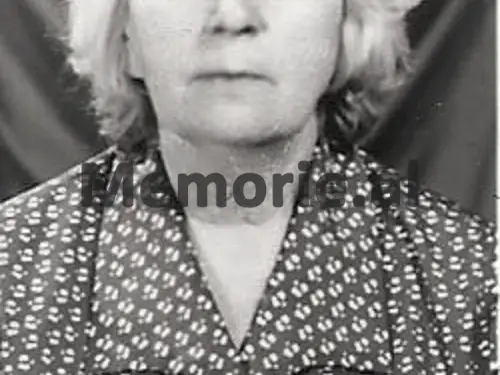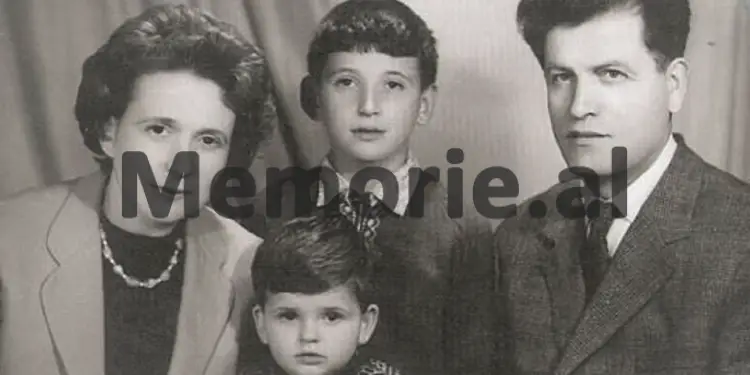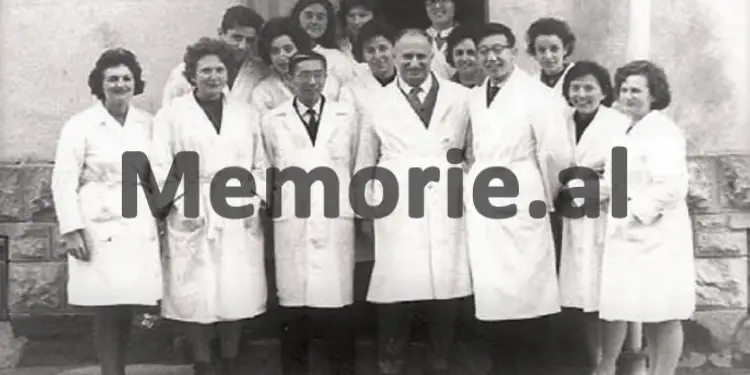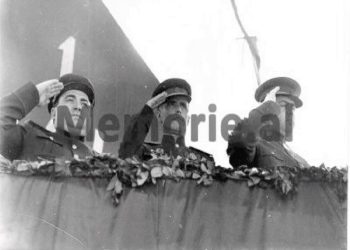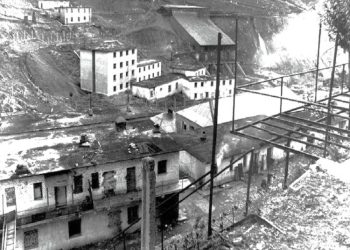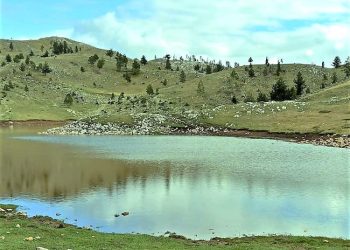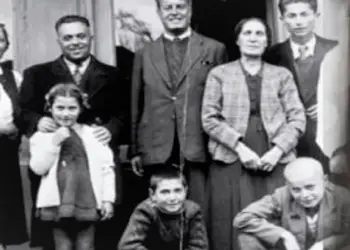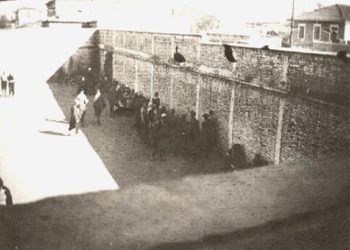Taisa Batkina Pisha
Twenty-fifth part
Memorie.al/ publishes the unknown story of the Russian Taisa Batkina (Pine), originally from Tula, Russia, the third child of a very poor rural family, who was left an orphan at a very young age, after her father lost her life while working in one of the coal galleries on the outskirts of Tula, where he worked as a miner (shortly after escaping arrest, accused of “supporting the enemies of the people”) and she grew up with difficulty great economic, as their city continued to be under the bombardment of German forces, which had reached as far as near Kursk. Taisa graduated from the Faculty of Chemistry, near the ‘Lomonosov’ University of Moscow, where she met and married the Albanian student, Gaqo Pisha, originally from the city of Korça, who at that time was studying at the Faculty of Philosophy in Moscow and both together in 1957, they returned to Albania, together with their newborn son, Sasha, and began life in the city of Tirana, where Taisa was appointed as a professor of Chemistry at the State University of Tirana, while Gaqo, in the chair of Marxism- where they worked until 1976, when the State Security arrested Taisa Batkina on fabricated charges, accusing her of being a “Soviet KGB agent” and sentencing her to 16 years in political prison, which she suffered. in the “Women’s Prison” in the city “Stalin”, from where she was released in 1986, while her husband, Gaqo Pisha, had died in 1983, from a serious illness. The tragic story of Taisa Batkina (Pine), in the inhuman camps and prisons of Enver Hoxha’s communist regime, where she spent a decade of her life, along with many compatriots from the former Soviet Union, or other Eastern European countries, comes through her memories, published in a book entitled “We hoped and survived”, memories which, her son, Aleksandër Pisha, kindly offered her for publication, in Memorie.al
We hoped and survived
I dedicate it to the bright memory of my husband, GAQO PISHA
This is a book of memories. In it I want to tell about my life and that of my friends, Soviet women, who tried prison for several years just because they got the courage and got married and linked their fate with that of Albanian students. The prison was part of the great GULAG in the small Balkan country, Albania, where for many years the bloody communist regime of Enver Hoxha ruled, who was a loyal student of Stalin and a follower of his cause.
Through this book I would like everyone to learn about the inhuman trials we experienced and the horrible years we spent in Albanian prisons, just because we… fell in love! And let no one ever forget what totalitarianism, despotism is and what the consequences of this system are.
Continued from the previous issue
Mine burial and grave loss after one year!
They told him to go out on Sunday to make up for the lost day, but… they were not allowed to. Nadiren was not allowed to leave the camp for a long time, for fear that he would leave work and go to the cemetery. Because this could be called escape and risked retrying the girl. We persuaded the best guard and she begged the director to give Nadira a job at the camp. The mother was informed of Mine’s death, she came to meet Nadiren and went to the cemetery. A year later, on the hill where the cemetery was located, a fire broke out, burning all the dried plants, bushes, trees and marks on the graves. Thus the tomb of Mines was lost. Nadirja was released with us, with the amnesty of 1986. I heard that she was married… I do not know anything else about her fate.
Krisanthi from Korça
In Korça lived an ordinary family, who lived like most of the inhabitants of this city, in her house. There was no big family, old mother, unmarried daughter, now elderly and single son. The girl was a photographer, knew her well and liked music, read a lot. The boy was a teacher. They lived quietly, not bad. The boy finally decided to get married and brought the young bride home. I do not know how the new relationships of these people were established, but after a while, the bride sought to take over the house and everything in the house. And he writes a report that his husband and sister are planning to flee abroad. That’s it! The report was made and the ‘car’ was set in motion. This happened in the mid-1970s, at the time of the most brutal persecution. Chrysanthemum and her brother were arrested. Krisanthi had very serious investigation. He was beaten by investigators, but also some young girls, arrested and those who put him in a cell specifically for this job, with the promise that they would be released. Krisanthi did not accept any charges, did not sign anything. After “winning” 8 years in prison and a broken kidney, she lay in bed and knitted. Its products, especially gloves, could not be distinguished from those of the factory. She was very ill, her damaged kidneys became infected, her nephritis passed into azotemia. He was taken to hospital, but it was too late to save him. Chrysanthemum died just as quietly as he lived. His brother was also in prison, they had given him an astronomical term, a 20, a 25 years…!
About the fate of their old mother, a young woman told me in the camp, which brought her from Korça. The emaciated, blind old woman was expelled from her home. Neighbors sheltered him in a niche. She struggled to get out of the house, begging neighbors’ children to buy her bread or milk. One day neighbors entered her chamber and found her dead. That’s it! This was the fate of one of the 70,000 prisoners and persecuted in Albania, in the country that built socialism…!
Grandmother Lena
I did not know in which chapter to write about Lena, in this, or in the chapter “diplomatic corps”. She was Albanian, but they made her a “Soviet spy” and put her in the “Nadja-Zoja-Nina” group. With Nadja and Zoja, she knew very little; he sold some fashion items and bought them. They did not and could not have other relationships, because they were completely different people and held completely different positions in society. Lena was 67 years old when she was arrested. She was widowed very early, raised her son, then grandson. Cooperated with the Security organs. She had been a nanny, a cleaner, a cook and, of course, an informant. Sometimes she worked in the houses of diplomats, high personalities, and even was a cook at the Albanian embassy in Moscow. Surely, even the sale of fashion clothing was made to order by the Security organs. Women came, bought, and mumbled. I do not know what Lena had done wrong before the organs, why they wanted to take revenge on her; she did not tell, but only this, nothing else, could explain her arrest. The “espionage group” was invented for Lena, the “spies” tried them, sent them to the camp, and later arrested him, joined him with this group without any need and without any basis. She admitted nothing, no accusation, but that did not help. They gave him 15 years. It seems that the Easter resentment was too heavy! Because they could only give him 7-8 years to make a lawsuit under the article “agitation and propaganda”, as was usually the case. Thus, Lena found herself in prison.
The son denied Lena!
The son denied it, did not come, did not help. The brother was left at home, old, sick and alone. He would write to them sometimes and send them something. By nature Lena was a very lively and cheerful woman. It was busy all day. He could not stay without work, he asked to be given something to do; they often let him go beyond the barbed wire fence to clean near the command building or around the camp. Short, full, she liked to giggle, laugh often, and joke. She was a kind woman, she tried to help as much as she could, but they also loved her, they helped her. Lena Nikaj, the “pregnant grandmother”, after being released from prison, sent Lena to the camp 800 All, as a sign of gratitude for her help and support. Every morning, dressed in prison clothes, with a bucket and a broom in his hands, Lena lined up with the brigades, which would go to work in the fields. After the brigades came out and the counting was done, it was the turn of the brigade, which worked around the camp, in the garden, at the pigs, or in other jobs. Lena’s bucket was something of great value; she was supposedly for trash, but usually returned to camp with some vegetables, which she managed to get across the fence. I wrote about the command cook. She felt sorry for Lena and, along with the garbage, threw fresh vegetables in the crate.
Lena shared everything with everyone. But age did its thing. The forces were leaving Lena. Over the last 2-3 years, she has weakened a lot. Then he received the news of his brother’s death. He experienced his loss very hard. Word reached him that others had occupied his apartment that his belongings had been thrown out. She did not want to believe it. Lena is slandered with severe sclerosis…! Lena was released from prison with the 1986 amnesty. She was… 77 years old. He did 10 years in prison. We traveled to Tirana on the same bus. On the way she wanted to get off near her house. Although everyone wanted to persuade her to walk a little further, because her apartment had been seized, because according to the rule, the Security organs had to help her, she did not listen, got off the bus, holding the key of the house tightly in her hands. But they did not even approach the threshold. Elderly, ill, in charge, Lena barely reached the branch of the Ministry of Interior, where she slept until morning, in the cold corridor, near the office of the service officer. The son did not come out to wait for her. Then they helped him, arranged him in the hotel, but the boy did not take him home, he came sometimes to see him, he also came to his granddaughter, the beloved granddaughter of his grandmother, about whom Lena talked so often to us in the camp. But now Lena was seriously ill, was hospitalized, returned to the hotel. After his release from prison, he lived only a few months.
Silvana
It often happens to me, when I tell something about life in Albania, that the listener does not believe me, he cannot imagine, that this may have really happened. But in Albania there was everything, there were many crippled fates. One such case was the fate of Silvana and her family. Silvana’s family lived in a village in the Kukes district of northern Albania. In the 1950s, Silvana’s father crossed the border with his family and settled in Yugoslavia, then moved to Australia. But things did not go well for him; the father abandoned his wife and four children. The mother was very heavy; she had to work, to raise the children. But he did not know English. Silvana told us how they taught their mother simple phrases in English so that she could work and use the means of transportation. Slowly life began to adjust, the children grew up, went to school. Silvana, a gifted girl by nature, drew well, at school she played in the drama circle. He then started retouching work in a photo studio, teaching in a theater studio. However, the State Security also found traces of her family. I must emphasize that the Albanian government did not save money to return Albanian emigrants to their homeland, to the communist paradise. The main goal was to take revenge on those who fled abroad, to punish them, to intimidate others, but also to prove to everyone, inside and outside the country, that Albanians are happy to return to their country. The role of agitators was played by employees of embassies, trade representations, often even people sent specifically for this purpose.
Silvana’s family returns from Australia!
Silvana’s mother began to receive letters from Albania, from her brothers, urging her to return to Kukës; they wrote to them how well they lived, they promised them paradise. Of course, the letters were written on duty by the Security organs, but the poor woman did not even think of such a thing. She had not seen her close people for years and felt very lonely in foreign lands. To return to their homeland, representatives of the Albanian authorities also tried to persuade him. Finally, she decided to return. They proposed to send his son, Kujtim, to Albania first. Demek, the boy will be fixed, and you come to him later. But upon trespassing on Albanian soil, 18-year-old Kujtim was arrested and charged with espionage. The boy suffered a nervous breakdown, became seriously ill and lost all judgment. The family in Australia knew nothing of Kujtim’s fate and was preparing to return home. When Silvana’s mother with her three children descended the stairs of the plane, they were surprised that they did not see the Memory among the people who were waiting for her. “He is doing military service, we do not know why he was not given permission,” they told the worried mother. Only a month later, the mother, who did not understand what was being done and was being tortured by the stranger, was told the terrible truth by her brother. Silvana’s mother lost consciousness. When they brought him to himself, they noticed that the unfortunate had lost his mouth! He did not speak for several months. But even though the boy was ill, Kujtim was tried and given 13 years in prison, which he had to spend in a psychiatric hospital. The family was allowed to see Kujtim. His condition was very serious; the boy did not know any of his own.
Silvana arrested after her sister escaped!
I always cried when I imagined the condition of Silvana’s poor mother. But life went on, the mother had three daughters, she had to live, work, to bring them to life. They were given houses in Kukës. Silvana worked, the sisters went to school, and then they got to work too. It is not hard to imagine how difficult it was for the beautiful, emancipated girls, raised in Australia, accustomed to living in Melbourne, to adapt to the living conditions in Kukës, in that small, poor town, between mountains in the north of the country, where the main event of the day, was the arrival of the line bus. Everything in this city was different, the houses, the people and, most importantly, the mentality. Understandably, the girls there were like white crows. A few years later, the younger sister could not bear it, crossed the border and fled the “host” country of the first. Silvana with her mother and sister were immediately interned in a small village near the chrome mine, where they worked in the enrichment factory. After a few months, Silvana was arrested. They kept him in solitary confinement for a long time, made fantastic accusations of espionage, diversion, etc. Finally, he was sentenced to 10 years in prison for agitation and propaganda. The indictment states, among other things: “He has expressed a positive opinion of the Australian articles.”
When Silvana was brought to the camp after the terrible months spent in prison, she could not come to her senses for a long time; she was on the verge of madness. He would sit for hours without speaking, and then suddenly he would walk, run up the stairs, shout, give speeches, threaten someone, then crouch in a corner and write something. In the camp for a long time he could not get used to it, to adapt, but he calmed down hand in hand, although he often hid somewhere and wrote. He wrote poems in English, long and certainly beautiful. Sometimes he would read to me. I understood almost no words, but they sounded beautiful. Silvana could not work in the field, because her nerves could not stand her, but her health did not allow her, she often had sciatica and could not move without the help of others. In her spare time she drew, read, knitted and counted the days until her mother and sister would come to see her. Once every six months they allowed him to leave the place of exile and come to see Silvana and Kujtim. At first they went to the hospital to the boy, then to Silvana. Silvana came back from meeting her eyes, which shone with joy, told the news and said that the brother was better, he had known his mother and sister. We understood that she confused desire with reality, but we tried not to disappoint her. /Memorie.al
The next issue follows




